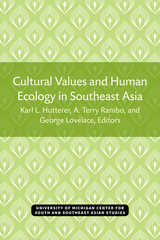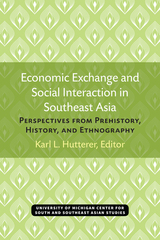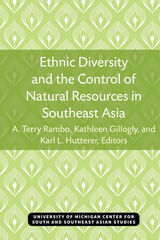3 books by Hutterer, Karl

Cultural Values and Human Ecology in Southeast Asia
Karl L. Hutterer, A. Terry Rambo, and George Lovelace, Editors
University of Michigan Press, 1981
Ecologists have long based their conceptual frameworks in the natural sciences. Recently, however, they have acknowledged that ecosystems cannot be understood without taking into account human interventions that may have taken place for thousands of years. And for their part, social scientists have recognized that human behavior must be understood in the environment in which it is acted out. Researchers have thus begun to develop the area of “human ecology.” Yet human ecology needs suitable conceptual frameworks to tie the human and natural together.
In response, Cultural Values and Human Ecology uses the framework of cultural values to collect a set of highly diverse contributions to the field of human ecology. Values represent an important and essential aspect of the intellectual organization of a society, integrated into and ordained by the over-arching cosmological system, and constituting the meaningful basis for action, in terms of concreteness and abstraction of content as well as mutability and permanence. Because of this balance, values lend themselves to the kinds of analyses of ecological relationships conducted here, those that demand a reasonable amount of specificity as well as historical stability.
The contributions to Cultural Values and Human Ecology are exceedingly diverse. They include abstract theoretical discussions and specific case studies, ranging across the landscape of Southeast Asia from the islands to southern China. They deal with hunting-gathering populations as well as peasants operating within contemporary nation-states, and they are the work of natural scientists, social scientists, and humanists of Western and Asian origin. Diversity in the backgrounds of the authors contributes most to the varied approaches to the theme of this volume, because differences in cultural background and academic tradition will lead to different research interests and to differences in the empirical approaches chosen to pursue given problems.
[more]

Economic Exchange and Social Interaction in Southeast Asia
Perspectives from Prehistory, History, and Ethnography
Karl L. Hutterer, Editor
University of Michigan Press, 1978
Economic behavior is governed by two major sets of boundary conditions: environmental and technological factors on the one hand, and conditions of social organization on the other hand. Indeed, social scientists are often particularly interested in the framework of exchange relationships: exchange of goods, services, personnel, and information. Economic exchanges lend concrete manifestations to social relations that themselves may transcend the economic realm and that otherwise are often difficult to trace.
Yet in social science research in Southeast Asia, the area of economic studies has lagged behind, despite the great study potential represented by the tremendous diversity of its physical and human environment. Economic Exchange and Social Interaction in Southeast Asia attempts to take advantage of that opportunity. As a number of the contributions to this volume show, many if not most of the systems organized on very different levels of integration interact with each other. Taken as a whole, they provide evidence of the incredible diversity of economic and social systems that may be investigated in Southeast Asia.
Yet in social science research in Southeast Asia, the area of economic studies has lagged behind, despite the great study potential represented by the tremendous diversity of its physical and human environment. Economic Exchange and Social Interaction in Southeast Asia attempts to take advantage of that opportunity. As a number of the contributions to this volume show, many if not most of the systems organized on very different levels of integration interact with each other. Taken as a whole, they provide evidence of the incredible diversity of economic and social systems that may be investigated in Southeast Asia.
[more]

Ethnic Diversity and the Control of Natural Resources in Southeast Asia
A. Terry Rambo, Kathleen Gillogly, and Karl L. Hutterrer, Editors
University of Michigan Press, 1988
The authors consider the ways in which the high degree of ethnic diversity within the region is related to the nature of tropical Asian environments, on the one hand, and the nature of Southeast Asian political systems and the ways in which they manipulate natural resources, on the other. Rather than focus on defining the phenomenon of ethnicity, this book examines the different social evolutionary contexts in which the phenomenon is manifested.
Companion volume to Cultural Values and Human Ecology in Southeast Asia (Michigan Papers no. 27).
[more]
READERS
Browse our collection.
PUBLISHERS
See BiblioVault's publisher services.
STUDENT SERVICES
Files for college accessibility offices.
UChicago Accessibility Resources
home | accessibility | search | about | contact us
BiblioVault ® 2001 - 2024
The University of Chicago Press









